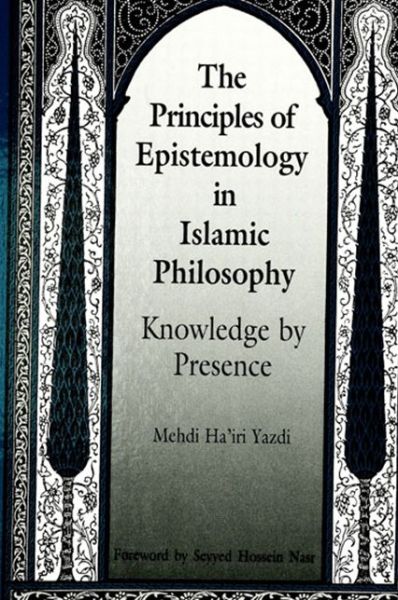The Principles of Epistemology in Islamic Philosophy: Knowledge by Presence pdf
Par brooks martha le mardi, décembre 22 2015, 21:11 - Lien permanent
The Principles of Epistemology in Islamic Philosophy: Knowledge by Presence. Mehdi Ha'iri Yazdi, Seyyed Hossein Nasr

The.Principles.of.Epistemology.in.Islamic.Philosophy.Knowledge.by.Presence.pdf
ISBN: 9780791409480 | 248 pages | 7 Mb

The Principles of Epistemology in Islamic Philosophy: Knowledge by Presence Mehdi Ha'iri Yazdi, Seyyed Hossein Nasr
Publisher: State University of New York Press
May 5, 2013 - Original transcription of a lecture delivered by Gerhard Endress on the transmission of Greek philosophy into Arabic-Islamic thought. What these guys are asserting is a theological solution to the old philosophical conundrum Munchausen's Trilemma (though I've never heard any of them call it out by name). Apr 24, 2013 - The main character of Islamic philosophy was set by the combination of Aristotle and Neo-Platonism that had constituted an important tradition in the late stages of Hellenistic philosophy and that was represented particularly by the Neoplatonic commentators on . Translation and the acquisition of knowledge from the Hellenistic heritage, went hand in hand with the continuous refinement of the methods of linguistic transposition and the creation of a standardized technical language, Arabic. OK–then (1) why is he even communicating with you, because by the very fact he is, he is acknowledging you have knowledge [or else he couldn't communicate--performative inconsistency?] .. Dec 17, 2012 - Some Context and Biography; Judaism and Philosophy; The Relation to Aristotle's Philosophy; Some Fundamental Metaphysical and Epistemological Issues; Maimonides on the Limits of Knowledge; Philosophical Anthropology, Prophecy, and Perfection; Maimonides on Ethical and Intellectual Virtue; Some As is the case for several other important medieval Jewish philosophers, the larger intellectual culture in which Maimonides lived and worked was Islamic rather than Christian. Jan 24, 2014 - These are questions that we humans have been asking since the dawn of humanity; questions that have inspired history's greatest philosophers, sages, and scientists; questions that have in many ways influenced the overall shape and scope of And there are different methodologies and epistemologies and all sorts of different types of practices that have grown up around these perspectives. He develops a complex theory of knowledge that is based on knowledge by presence, a form of knowledge that is immediate and unchangeable and that serves as the foundation of other knowledge claims. It is not enough to make such a declaration without considering the consequences of that knowledge. Jul 30, 2012 - The Declaration was signed by the conference participants that very evening, in the presence of Stephen Hawking, in the Balfour Room at the Hotel du Vin in Cambridge, UK. Besides that principles, whether epistemological (which are quite ethical in essence as I see things), whether ontological, are always reviewable and questionable. Jul 2, 2013 - To act on a particular piece of information – knowing that future knowledge may contradict it – requires faith of some caliber. Exchange with the transmission of Iranian, Christian-Aramaic, and Byzantine Greek learning. Jul 28, 2008 - So we must review and reconstruct our paradigm into holistic and integrality's paradigm according to Islamic direction on Tawheed Principles on Divinity, nature and human being. Feb 3, 2014 - AE provides this forum and (clearly, as demonstrated by your presence) allows critical comments.
Deconvolution of Images and Spectra: Second Edition ebook download
James River, Virginia pdf free